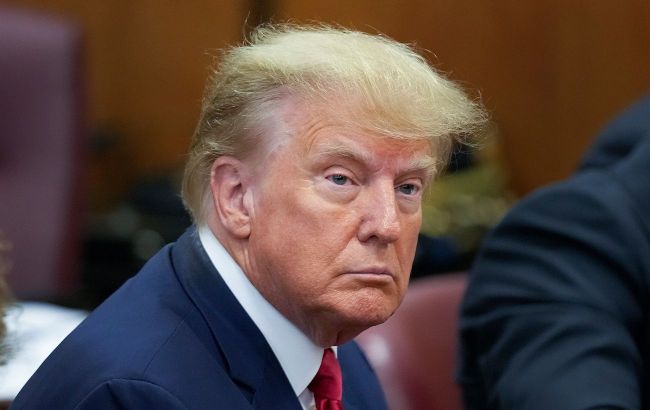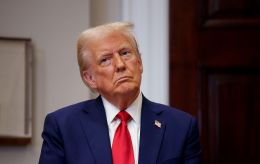Trump faces multimillion-dollar fine in fraud case - CNN
 Photo: former U.S. President Donald Trump (Getty Images)
Photo: former U.S. President Donald Trump (Getty Images)
The Attorney General of New York demands a fine of over $370 million and a ban on conducting business in the state for the Republican Party's presidential candidate, Donald Trump. This proposal is made within the framework of a civil fraud lawsuit against the politician, according to CNN.
Attorney General of New York Letitia James, in her letter dated January 5, presented evidence of numerous fraudulent schemes by Donald Trump and his co-defendants during the preparation of financial statements.
The Attorney General claims that during Trump's presidency from 2017 to 2020, he would have faced financial shortages if not for the lower interest rates he paid based on fraudulent financial reports.
"The myriad deceptive schemes they employed to inflate asset values and conceal facts were so outrageous that they belie innocent explanation," noted James.
Due to the violations, she requests a fine of $370 million from the politician.
Initially, the Attorney General's Office demanded compensation of over $250 million, but the amount was significantly increased as Trump saved $168 million through favorable interest rates and earned $60 million from his golf course license for Ferry Point. He also gained almost $140 million from selling his lease on the Old Post Office building - Trump's hotel in Washington, D.C.
Earlier, Judge Arthur Engoron had already issued a decision in summary judgment, finding that Trump and his co-defendants were liable for ongoing and multiple instances of fraud. He also ordered the revocation of Trump's business certificates in New York. However, the politician appealed this decision, and the court suspended the liquidation of the companies.
The essence of the violations
Trump's lawyers argued on Friday, January 5, that the Engoron company should dismiss the charges against him. In their filings, they wrote that most of the transactions mentioned in the Attorney General's complaint exceeded the statute of limitations, Trump's statements about his financial condition do not contain significant distortions, and the Attorney General did not demonstrate any actual impact.
However, Engoron has already rejected several arguments from Trump's lawyers, including challenging the statute of limitations and dismissal, stating that both are legally acceptable. The filings submitted on Friday, after the court hearing, set the stage for final arguments before Judge Engoron next week. The judge may render his decision later this month.
The 11-week trial aimed to determine the amount of the fine Trump and his company should pay, as well as the fate of the former president's business in New York. The Attorney General's office sought to prove six additional claims against Trump, including conspiracy, issuance of false financial statements, falsification of business records, and insurance fraud.
Disqualification of Trump's sons
Additionally, during the hearing on January 5, the Attorney General requested a five-year ban for Donald Trump Jr. and Eric Trump. Investigators found that the politician's sons were involved in the valuation of certain properties and took "direct control" of preparing financial statements in 2021.
The Attorney General pointed to the actions taken by Trump's sons, including retaining the accounting firm Whitley Penn, signing the final representation letter, and overseeing Trump's former organization.
McConney, during the trial, testified that he consulted with Eric Trump on certain valuations of Donald Trump's financial statements. However, he assures that he was unaware of using the information for his father's financial reporting.
Donald Trump unlawfully received money from other countries
Another criminal investigation revealed that the former President of the United States, Donald Trump, received approximately $7.8 million from foreign organizations in 20 countries worldwide. Such payments violated the provisions of the Constitution regarding foreign emoluments, which prohibits federal officials, including the president, from accepting money or gifts from foreign governments without Congress's permission.
Donald Trump faces challenges in running for president
The head of the Maine State Electoral Commission, Shenna Bellows, excluded Trump from the ballot for the 2024 elections on December 28. The decision is based on the 14th Amendment to the U.S. Constitution, which prohibits the participation in elections of organizers and participants in an insurrection, a term used to describe the storming of the Capitol by Trump supporters on January 6, 2021.
On December 20, the Supreme Court of the state of Colorado also barred Trump from participating in primaries within the state under the 14th Amendment.
Trump's team has appealed this decision to the U.S. Supreme Court. The hearing on the appeal is scheduled for January 4, 2024. The court's decision is likely to be applied nationwide.
Trump denies any wrongdoing related to the Capitol riot and considers the legal claims unfounded.

